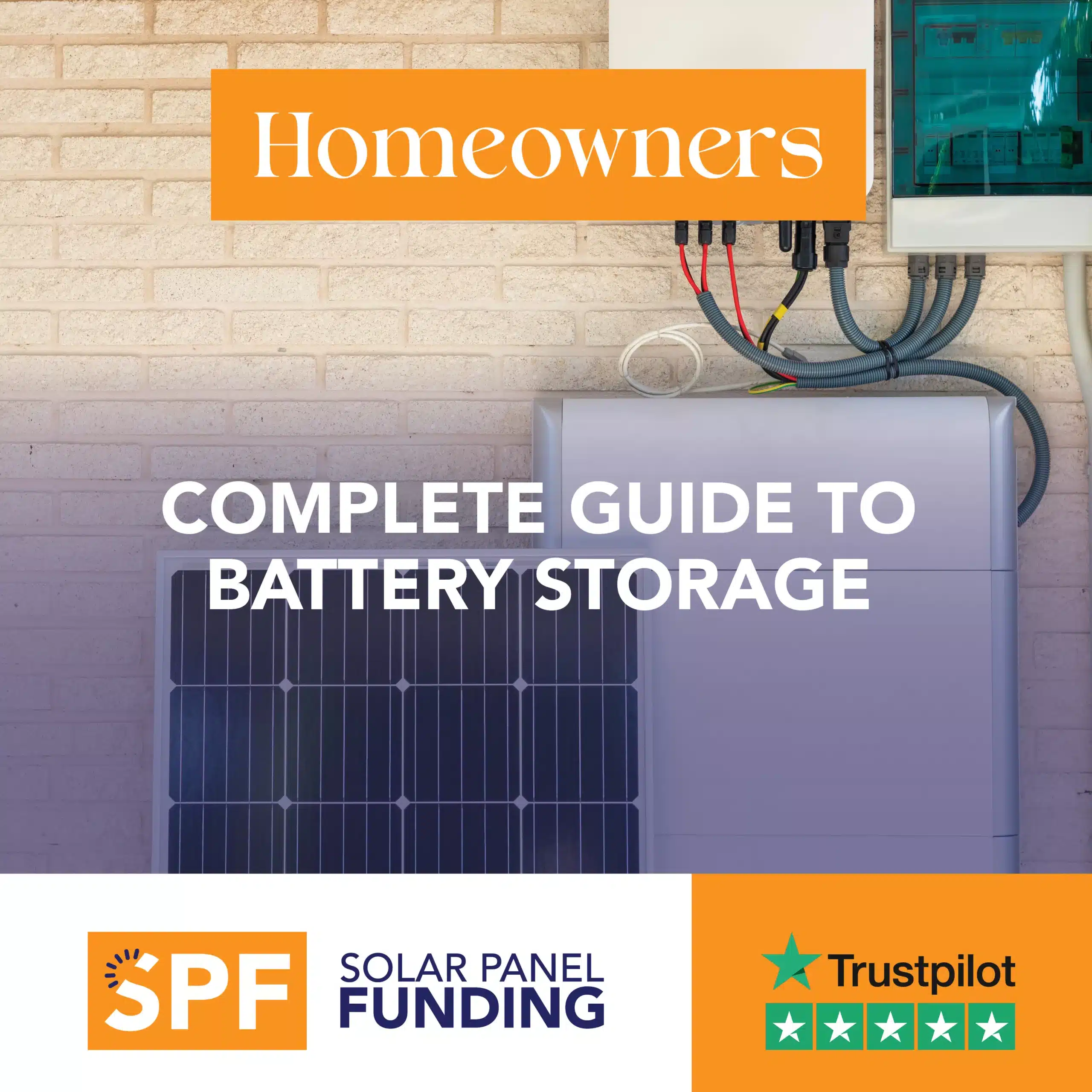
- What Is Solar Battery Storage for Solar Panels?
- How Do Solar Panels Work with Battery Storage?
- How to Install Solar Panels and Battery Storage
- How to Connect Solar Panels to Battery Storage (AC vs. DC)
- The Cost of Solar Panels and Battery Storage in the UK
- How Much Is Battery Storage for Solar Panels?
- Is It Worth Getting Battery Storage with Solar Panels?
- Factors Affecting Battery Energy Storage Cost
- Maximising Savings and Earnings
- Potential Savings at a Glance
- Maintenance and Lifespan
- Next Steps: How Solar Panel Funding Can Help
As energy prices increase and homeowners seek to cut costs, solar panels with battery storage are an appealing option. Many people now ask what is a solar battery storage system, and how it can help reduce reliance on the grid. By storing energy from the sun’s rays when it is available and putting it away in a storage battery for solar panels for use when needed, access to solar energy is available at all times. Here’s an overview of how solar panels with battery storage work, standard costs, the installation process, and why this is now such a vital investment for UK homes.
What Is Solar Battery Storage for Solar Panels?
A battery storage system saves excess energy produced by your solar panels. Your home can use that stored energy later, usually in the evening or on gloomy days, rather than feed excess energy back to the National Grid.
- Main Advantages
- Save on Electricity Bills: Lower dependence on grid electricity, particularly at peak rates.
- Energy Independence: Have greater control over your energy supply.
- Cleaner & Greener: Raise the proportion of renewable energy in your home.
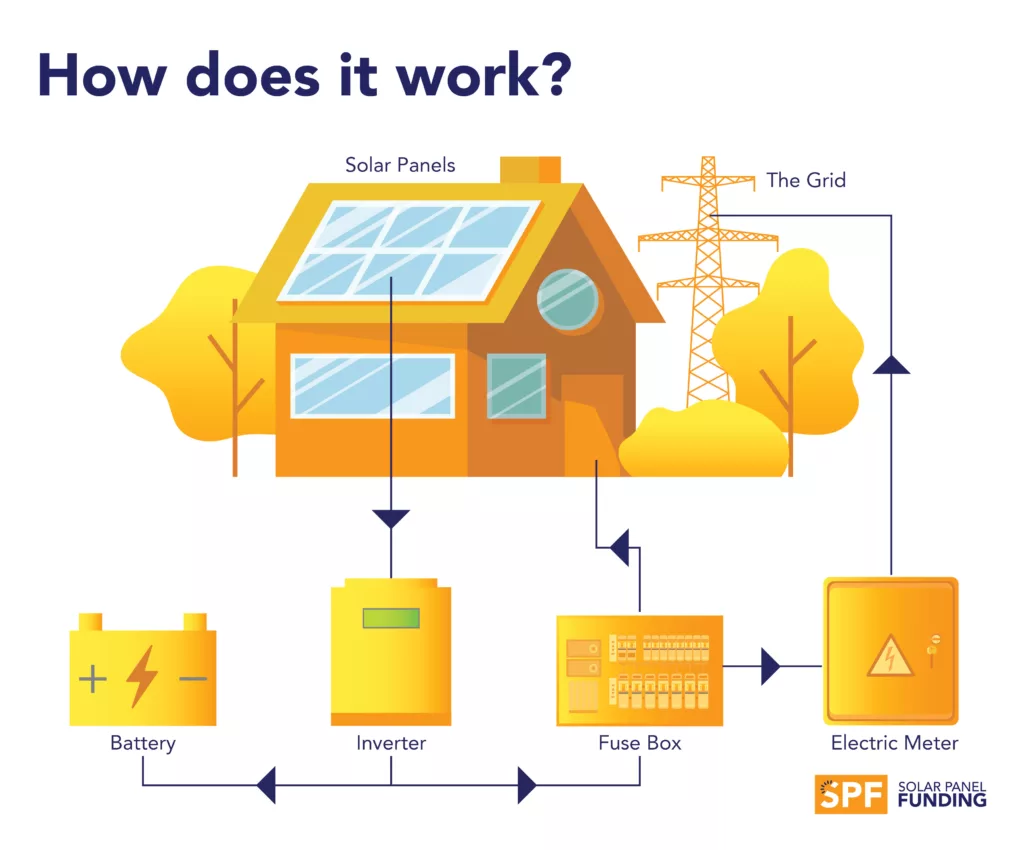
How Do Solar Panels Work with Battery Storage?
- Solar Generation: Solar radiation is converted to direct current (DC) electricity through roof mounted panels.
- Inversion to AC: An inverter turns DC to AC, which supplies electricity to your home.
- Battery Storage: The excess electricity is charged to battery storage.
- Night Use: At dusk or when consumption exceeds panel production, battery discharge is used to supply demand at home.
How to Install Solar Panels and Battery Storage
If you’re looking to install battery storage on an existing system, or install both at one time, Solar Panel Funding can assist. We’re a fully qualified company with an array of the UK’s best installers, so that you can have professional advice and high-quality work from fully certified professionals.
Standard Process
- Assessment & Quote: We assess your roof area, energy consumption, and objectives (e.g., saving money, emergency power).
- System Design: We suggest the optimum panel wattage, inverter size, and battery capacity.
- Installation: Panels are installed on your roof and connected to an inverter, which is then linked to the battery system.
- Certification & Handover: We provide all documentation, including MCS certificates and warranties.
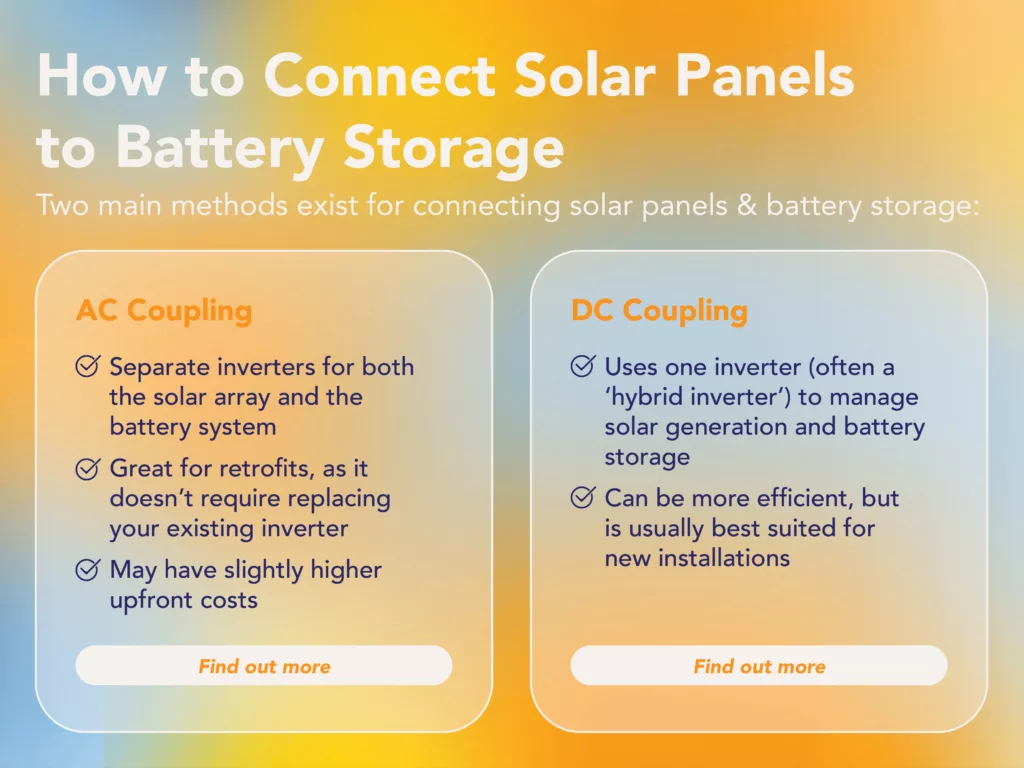
How to Connect Solar Panels to Battery Storage (AC vs. DC)
Two main methods exist for connecting solar panels & battery storage:
- AC Coupling:
- Separate inverters for both the solar array and the battery system.
- Great for retrofits, as it doesn’t require replacing your existing inverter.
- May have slightly higher upfront costs.
- DC Coupling:
- Uses one inverter (often a ‘hybrid inverter’) to manage solar generation and battery storage.
- Can be more efficient, but it is usually best suited for new installations.
Your Solar Panels Funding specialist will suggest the system that suits your budget, as well as your home energy requirements.
The Cost of Solar Panels and Battery Storage in the UK
A common question is “What is solar battery storage, and what is the cost of solar panels and battery storage?” Several factors influence price: system capacity, battery technology, and installation complexity.
- Solar Panels: A typical 4kW system can range from £5,000 to £7,000 installed.
- Battery Storage: Costs can vary from £2,000 for smaller systems (3kWh) up to £8,000+ for larger, premium batteries (8kWh or more).
By opting to install solar panels with battery storage simultaneously, you may save money through package deals. Solar Panel Funding can provide tailored quotes so you know precisely what to expect.
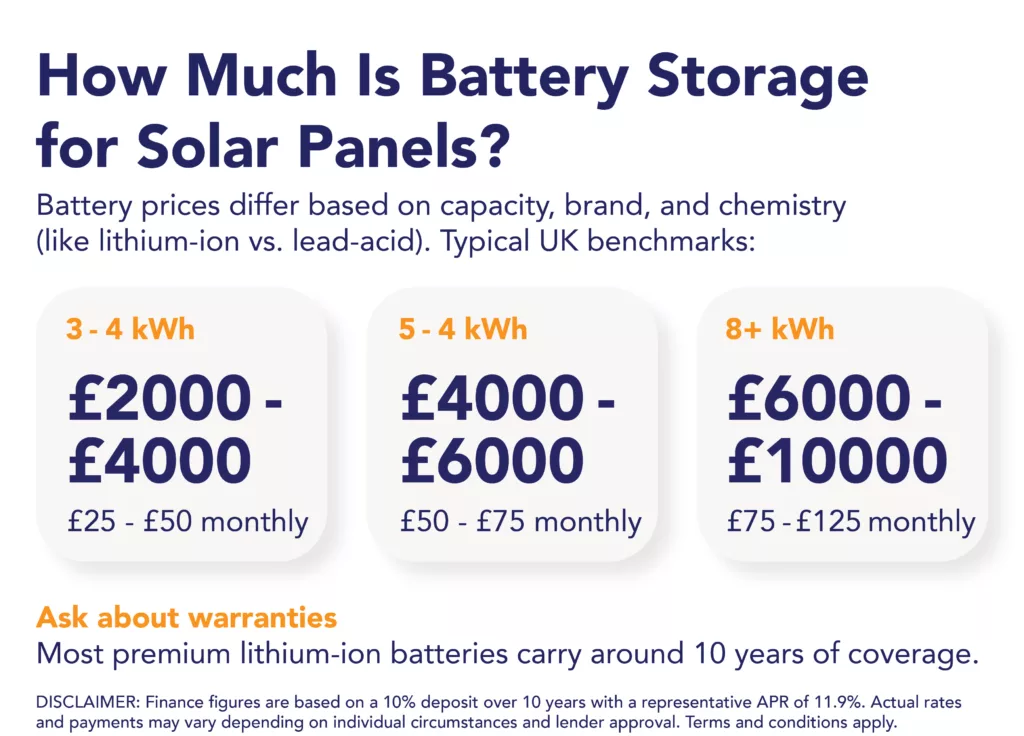
How Much Is Battery Storage for Solar Panels?
Battery prices differ based on capacity, brand, and chemistry (like lithium-ion vs. lead-acid). Typical UK benchmarks:
- Small Systems (3–4kWh): ~£2,000–£4,000
- Medium Systems (5–7kWh): ~£4,000–£6,000
- Large Systems (8kWh+): ~£6,000–£10,000
Ask about warranties—most premium lithium-ion batteries carry around 10 years of coverage.
Is It Worth Getting Battery Storage with Solar Panels?
Installing a solar panels + battery storage system is increasingly worthwhile for many UK homeowners. Key considerations:
- Time at Home: If you’re often out during peak sunlight, storing excess generation for evening use can significantly cut bills.
- Tariffs: High grid electricity costs make using power your own solar panels generate, is more cost-effective.
- Environment: Lower your carbon footprint by maximising renewable energy systems consumption.
- Payback Period: With rising energy prices, payback times are getting shorter, often between 5 and 10 years.
- Capacity & Power Rating: The size of the solar battery and its power output affect cost; larger batteries or those with higher power output command higher prices.
Factors Affecting Battery Energy Storage Cost
- Battery Chemistry: Lithium-ion batteries generally cost more but last longer than lead-acid alternatives.
- Capacity & Power Rating: Larger batteries or those with higher power output command higher prices.
- Brand & Warranty: Premium brands often offer longer warranties and better long-term performance.
- Installation Complexity: Retrofitting battery storage to an existing system can be more involved than installing both from scratch.

Maximising Savings and Earnings
- Optimise Appliance Use: Run appliances (washing machines, dishwashers) during the day or when your battery has surplus energy.
- Smart Tariffs: Charge your battery on cheaper off-peak electricity if sunlight is limited, saving on higher peak rates.
- Export Schemes: Some suppliers offer payments (Smart Export Guarantee) for excess energy returned to the grid.
- Home Efficiency: Combine a battery with measures like improved insulation or LED lighting for even greater savings.
Potential Savings at a Glance
For many homeowners, installing solar panels and battery storage can reduce grid electricity usage by 60% or more. The exact figure depends on your energy consumption habits and the size of your system. Over the system’s lifespan, these savings can be substantial, often leading to a shorter payback period than standalone solar panels.
Maintenance and Lifespan
Modern lithium-ion batteries need minimal maintenance:
- Monitoring: Most systems include an app or online portal to track performance and system health.
- Battery Care: Avoid deep discharge cycles to prolong battery life.
- Regular Check-ups: Periodically confirm your inverter and battery are functioning optimally.
A well-maintained battery can last 10–15 years, though its capacity will slowly diminish over time.

Next Steps: How Solar Panel Funding Can Help
At Solar Panel Funding, we’re a fully qualified installer and partner with some of the UK’s top MCS-certified professionals. Instead of searching for multiple quotes, simply:
- Contact Us: Request a personalised quote that includes both solar panels and battery storage.
- Consultation & Design: We’ll evaluate your current or planned setup, recommend the right battery size, and calculate potential savings.
- Installation & Support: Our team handles everything from fitting the panels to commissioning the system and handing over documentation.
- Enjoy the Savings: Start benefiting from lower energy bills, a smaller carbon footprint, and a more secure power supply.
Conclusion
Whether you’re adding battery storage for solar panels to an existing system or starting from scratch, the benefits for UK homeowners are compelling. Rising energy prices, improved battery technology, and accessible financing options make solar panels with battery storage a smart, future-proof investment.
- Assess Your Needs: Determine if your home’s energy usage and lifestyle justify the cost.
- Get Professional Advice: Consult an MCS-certified installer to get a tailored system design and quote.
- Enjoy the Benefits: Once installed, monitor your energy production and savings—and watch your electricity bills shrink.
If you’re ready to explore battery storage for solar panels, contact reputable installers, compare quotes, and take the next step towards a greener, more energy-independent future.

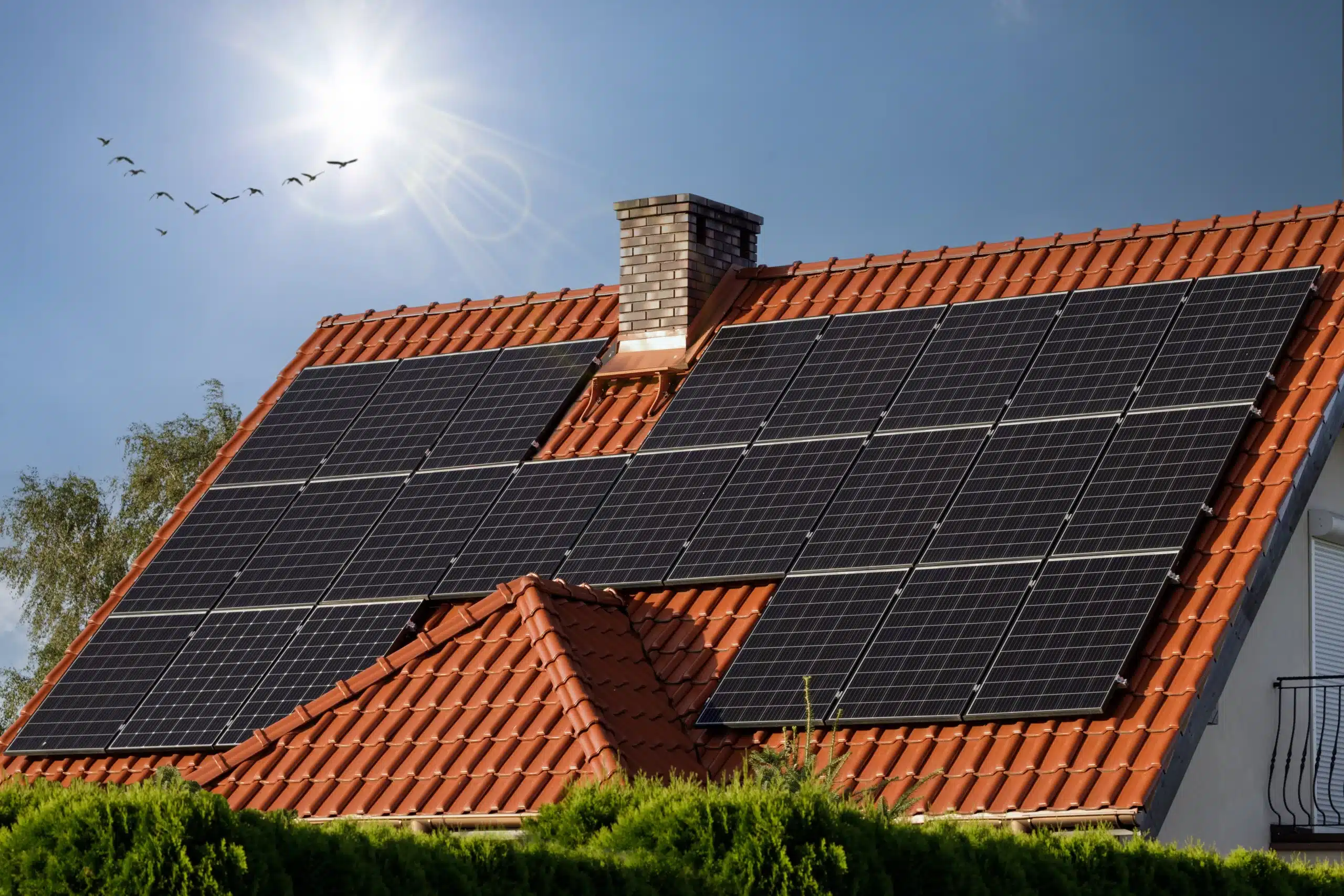


![Can You Fit Solar Panels on a Flat Roof in the UK? [2025] 9 can you fit solar panels on a flat roof in the uk](https://www.solarpanelfunding.co.uk/wp-content/uploads/2025/10/Blog_Can-You-Fit-Solar-Panels-on-a-Flat-Roof-in-the-UK-1024x1024.webp)